He started with the earthworms.
As far back as he can recall, political strategist and activist Bryan C. Barnhill II, the youngest member of the Wayne State University Board of Governors, felt the need to make a difference, to safeguard what he saw as vulnerable, endangered.
For a preschool-aged Barnhill, that meant sifting through wet dirt on rainy days around his childhood home on the east side of Detroit, trying to make sure that the worms were doing OK.
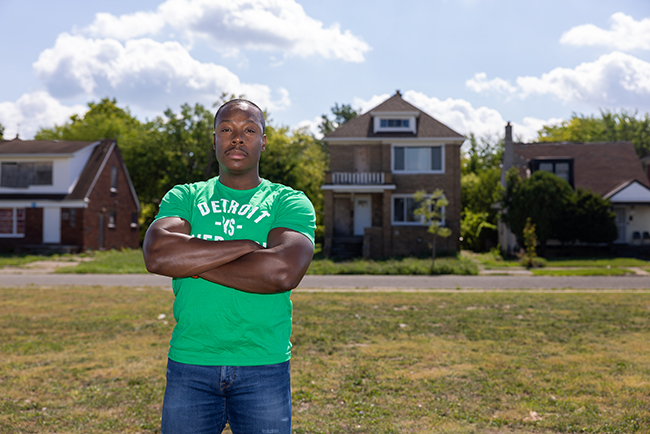
“I was a serious little kid,” he recalls with a brief, wry grin. Hair braided, eyes narrowed and focused, he leans back in his chair during a morning chat at the Fisher Building in the city’s New Center area and crosses his legs. “Because I felt like, for some reason, the stakes were high,” he continues, his baritone a mix of gravitas and fond remembrance. “I needed to do the right thing so I could have a chance. And I felt like I had a duty to try to do something. My mother tells me that I was the type of kid who would go outside when it was raining and try to put the worms on the leaves, to protect them from the water. I really thought I was saving the worms.”
That sense of responsibility solidified as he grew older. As a teen, he stood up to neighborhood bullies who tried to pick on smaller children. He joined his churchgoing mom to help with the block club she founded. He cut unruly lawns in vacant lots and swept up trash in front of the crumbling, abandoned homes that dotted his struggling community around Conner Avenue and Gunston Street.
“My parents are what folks call ‘good people,’” he says of his mom, a nurse who earned her degree from Wayne State University, and his dad, a professional truck driver. “They always tried to instill good values in me and my sister. We always had activities. And my mother would give us responsibilities in the neighborhood.”
But there was plenty of fun to be had, too, be it on the bikes he rode freely throughout the neighborhood, on the swing sets that brought throngs of kids to his family’s backyard or atop the blacktop basketball courts where he’d play pick-up games on hot summer days. Barnhill says those memories, co-mingled with that irrepressible sense of duty, produced a love and deep appreciation for Detroit, for its blue-collar hustle and its unbowed sense of optimism in the face of struggles and challenges.
Even now, long after his family moved away from Conner and Gunston, more than a decade after Barnhill graduated Detroit Renaissance High School to pursue a degree at Harvard University and years after he found himself at ground zero of one of the most seismic political upheavals in recent Detroit history, Barnhill says his commitment to and love for his city endure.
“I’m very much a product of my community,” he says. “The beauty of it, the strength of it. There is a dark side – but you have to find light in the darkness.”
Answering the call
These days, the east side kid who once casted about in mud in search of earthworms to rescue has become a man — a still-youngish one, at that — who breathes the same rarefied air as the city’s and state’s most influential politicians, businessmen and powerbrokers. He’s gone from the neighborhood block club to board seats on the Detroit Institute of Arts, the United Way of Southeastern Michigan and the Detroit/Wayne County Stadium Authority, among other institutions. And the precocious son who grew up amidst the blight of Conner Avenue is now a father of two and a husband, still an east-sider, but one ensconced in the city’s tony Indian Village neighborhood. Nevertheless, for the political wunderkind who many consider most responsible for the 2013 mayoral election of Mike Duggan, the first white Detroit mayor in nearly half a century, the same sense of duty and responsibility he’s harbored since childhood continue call.
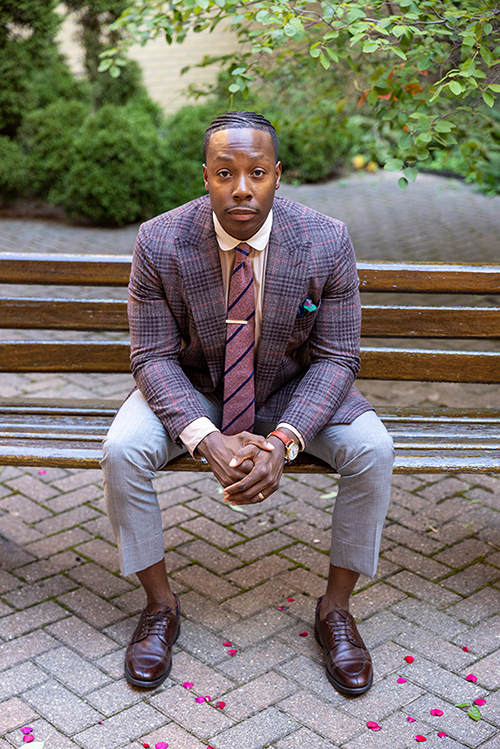
And Barnhill continues to find ways to answer. At present, he works at Ford Motor Co. for the automaker’s Smart Mobility City Solutions Group, where he has an important hand in molding Ford’s urban ecosystem for mobility innovation in Detroit. And while Barnhill says he has no desire to run for any elected office beyond the one he holds as a WSU governor, his successful campaign work for groundbreaking political figures such as Charles Pugh — the city’s first openly gay city councilman — and Mayor Duggan suggests that, at the very least, he could play the role of kingmaker in local election cycles to come.
“There is little to no chance of me running for another political office — like maybe 5%,” Barnhill says emphatically. “I don’t think we need me to run for office. There are tons of talented people out there who can do it. We need more folks who share similar viewpoints, who have a perspective of people coming from our community, to be in a position to support these campaigns.”
However, Barnhill makes little secret of his desire to help mold those future campaigns and candidates.
“Now, I have the experience to say, ‘OK, this is what a successful campaign looks like. This is what successful administration looks like. This is what an unsuccessful administration, unsuccessful politician looks like. This is what a successful business looks like. This is how successful organizations operate. This is how you make change within that context.’ I like the Vernon Jordan types, the Clarence Avants,” he explains, referencing the civil rights leader and music mogul who both earned reputations as fearsome behind-the-scenes operatives.
He confesses that his desire to steer clear of political office stems in part from a reluctance to feed too much into a sense of self-importance. “I’m a Leo. We’re told our egos can get out of control. And so for me, it’s also thinking, If I really want to make a difference, why do I need to be in the spotlight? It’s my ego. I want to have that in check. When you see a lot of people make mistakes, it’s their ego that gets in the way.”
He doesn’t say it, of course, but the inference to one of the biggest scandals in Detroit history is unmistakable: Barnhill wants no parts of the sort of missteps that felled the last young turk to storm Detroit politics, disgraced ex-mayor Kwame Kilpatrick.
Of course, in some ways, that scandal helped create the opportunity for Barnhill to showcase his considerable political and organizational talents. Kilpatrick’s fall and the subsequent rocky tenure of elected successor Dave Bing left many Detroiters angry, disappointed and mistrustful of local leadership — and inspired a longtime local powerbroker, then-Detroit Medical Center CEO Mike Duggan, to fill the seat.
But Duggan is white in a city that’s more than 80% Black and that hadn’t elected a white man to serve as mayor since Roman Gribbs left office in 1974. The challenge, most observers agreed, would be formidable, if not outright impossible. And the challenge grew even steeper after Duggan failed to qualify for the ballot and was forced to run a write-in campaign that few thought he’d win.
Barnhill was among that few.
Making Their Breaks
Up until then, though, Barnhill hadn’t garnered much formal political experience. As an older teen, he had cut his teeth in the By Any Means Necessary (BAMN) grassroots movement, where he often engaged in demonstrations and protests centered on issues such as anti-affirmative action measures and inequitable school funding. Barnhill had also belonged to the citywide student council, where he and close friend QuanTez Pressley served as school board representative and vice president, respectively.
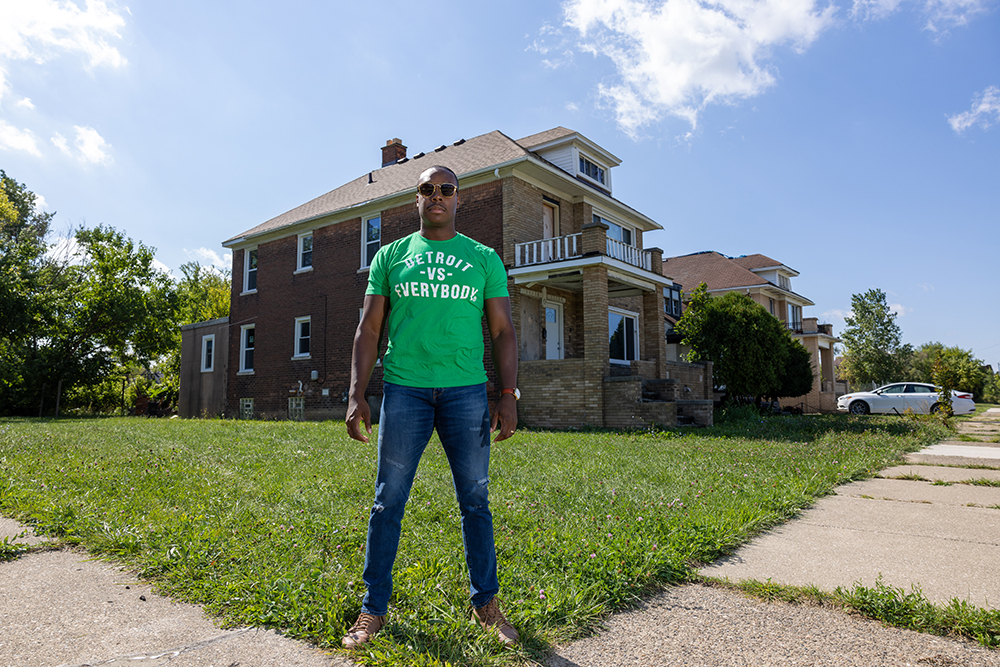
“Sometimes, I was sitting down with the school superintendent, and some other times, I’m coming in there with a bullhorn behind me,” he recalls. “BAMN was fascinating at that time because I felt like they gave me an outlet to be politically active in a way that some of the more tried and true organizations had not. In addition to the activity, we would have study groups where we’d read Karl Marx, read about the civil rights movement, and then go out and organize folks for things like the National March to Defend Affirmative Action in Washington, DC.”
However, he says he began to evolve after graduating high school and heading off to Cambridge, Massachusetts, to attend Harvard University. He was invited into the exclusive circle of the university’s “final clubs,” where he began to rub shoulders with influencers in business, politics and culture. Barnhill says he started to realize that he had an opportunity to network and
make change in ways he’d never considered possible while growing up in Detroit.
“Going there opened me up to a whole new level of wealth and power,” Barnhill says. “Some of the people in these clubs are, quite frankly, some of the wealthiest, most powerful people who run the world. And the cool thing is we’re friends. We’re friends, and now we’re in a club together, and we’re just kind of hanging out, supporting one another. They’re listening to my ideas. I’m listening to some of theirs.
“It was not the black-and-white situation that I thought it was. I had a unique position to be in places to do things, have a relationship with audiences that not a lot of folks in our community would tend to have, and this is the kind of attitude that I have today. I want to be able to take my perspective, my experiences, and make change within these groups in these rooms.”
Of course, he says, his more radical peers in Detroit hadn’t even wanted to him to go away to school: “They were like, ‘Why would you want to do that?’ But in my mind, I was like, ‘I’m doing this for my community. I’m going here for my family.’”
And after graduating Harvard, Barnhill says, he made the decision to return to Detroit for those same reasons. Although he’d landed a cushy position handling private equity in New York City, he knew his fate rested back in his hometown.
“The plan was always to come back,” Barnhill says. “I just thought that I would come back as this rich and successful person who can just kind of do my thing, but it was a special moment that I think was the culmination of a lot of crises. You had Kilpatrick. He was going through what he was going through. You had the auto industry headed toward bankruptcy. You had the city headed toward bankruptcy. There was the mortgage foreclosure crisis. And I got tired of reading about how horrible it was in Detroit and then having conversations with people in New York like, ‘Hey, man, you’re from Detroit. What’s going on?’ As I reflect on everything that energized me when I was younger, I was trying to do positive stuff in the community.”
Barnhill says he got calls from his two closest friends, Pressley — now a pastor at Third New Hope Baptist Church in Detroit — and current state senator Adam Hollier, both of whom also were trying to find their niche. “QuanTez had been talking about going the Peace Corps, but he said, ‘Why would I do that when I can just do the same stuff in Detroit?’ Adam was already back in Detroit after going to [University of Michigan] to get his degree in urban planning. They were already committed to coming back and wanted me to join up with them. Eventually, I was like, ‘I’m in.’”
Back on the scene
And so he came back … just as Detroit seemed ready to implode. Kilpatrick had been ousted from office and was headed toward a criminal trial and, ultimately, a conviction and lengthy prison sentence. The city was teetering on the edge of bankruptcy, with its first emergency manager only a few years away. And the local economy seemed to be in shambles.
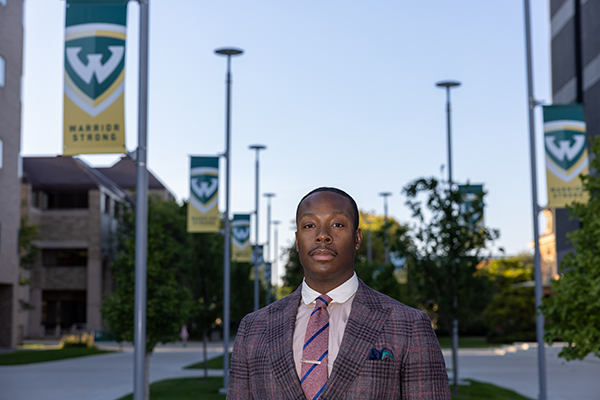
Barnhill felt that pain, too. Although he was fast becoming adept at networking and building relationships, his efforts didn’t immediately translate into success — or even employment. “I was sleeping at my parents’ house, trying to find a job,” he says. “And I appreciate my parents because they know me. If they didn’t, they would’ve been very upset. I didn’t want to be a loser with a Harvard degree.”
Eventually, he landed with nonprofit group Southwest Housing Solutions, which handled low-income housing. But he also decided that he’d devote his free time and energy volunteering for one of the few local political aspirants who didn’t mind his lack of experience, then-TV news personality Charles Pugh, who’d just left Fox 2 Detroit to make a run at a city council seat in 2009.
“QuanTez was volunteering for the campaign as well, so we spent most of the time passing out flyers,” Barnhill remembers. “And then QuanTez and I started figuring out other ways we could make a contribution. Charles didn’t need that much help in terms of notoriety. Everybody knew who he was. So, we figured we could add value in sharpening the focus of the policy issues.”
Leveraging the experience of other, more seasoned volunteers, Barnhill said he and Pressley began to promote community discussions aimed at focusing the candidates on key policy points. They attended debates and took careful notes about community members’ talking points. And they fed everything they learned into the campaign.
Pugh won handily, earning the most votes of any candidate, which automatically earned him the city council presidency. And Barnhill, then barely 23, had officially served notice that he was a political force to be reckoned with.
“Working for Charles gave me an opportunity to develop a reputation and develop relationships among some of the other political leaders and business leaders,” Barnhill says. “Little did I know before joining that office that we would be grappling with some very challenging issues. And because of the position that Charles had enabled me to be in, I would be in meetings having conversations about these very complicated issues and had, I think, developed a reputation of being a learned person, a thoughtful person and a strategic thinker. It got to a point where Charles would trust me with being in some of these meetings by myself. And it would be hilarious because I would see the look on people’s faces. They’re excited about meeting Charles and they see me. They’d get disappointed — but, by the time they left, we had developed a rapport.”
Barnhill’s tireless efforts to connect eventually led to a friendship with a local Republican figurehead, who hoped that Barnhill might direct his talent toward conservative candidates. But when the GOP operative realized that Barnhill wasn’t likely to shift rightward, he began putting the upstart strategist with key Democratic colleagues.
“In politics, just like in sports, opponents have relationships with one another,” Barnhill explains.
Turned out, one of those colleagues was good friends with a hospital executive and former Wayne County prosecutor who had been mulling a run at the mayor’s seat in the aftermath of Kilpatrick’s fall. “So he called me,” Barnhill recalls, “and said, ‘Hey, Mike Duggan is thinking of running for mayor. Would you be interested in leading the exploratory committee?’”
Barnhill didn’t know much about Duggan’s history, so he reached out to the political figure who knew his work best. “I called Charles Pugh, and he said, ‘What I know about Mike Duggan is that he’s able to get a lot of stuff done. I think he would be great for the time that we’re in.’ And this was as the city was headed toward bankruptcy. Mike was someone who’s very skilled at running large-scale organizations and putting forth different initiatives. I thought, ‘OK, this capability is going to be what we need.’ Also, I’m very aware of race and racial dynamics. We are totally aware of the racial animus that has existed in this region. And the city of Detroit has basically been a proxy for Black folks. I thought that Mike Duggan would help bring in resources to benefit Detroiters.”
After multiple positive meetings, Barnhill took over the exploratory committee, which included a broad swath of Detroit community leaders. “And from there, we started to develop the beginning stages of the policy platform. We took this focus on neighborhoods and went from there.”
It wasn’t long before Duggan took notice of Barnhill’s work, his energy and his knack for making the right connections at the right time. Soon, he asked the young Harvard grad to come on board as his campaign manager.
Barnhill was initially hesitant. “I told him, ‘Hey, look, I never ran a campaign before. In fact, the only campaign I was a part of, Charles Pugh’s campaign, I was pretty much a paper-passer-outer,’” he says with a laugh. “But I told him that I’d do it as long as I got mentorship and support.”
He quickly began working to strengthen Duggan’s ties to not only corporate leaders but, more critically, to the neighborhoods in the city. “Our job was really to build some momentum so that we could convince people who were influential folks in town — whether influential in business or influential in the community — that we could actually succeed,” he says. “We ended up pursuing this grassroots approach. A couple of people said they’d support Mike, but the majority of folks were risk averse. So instead of trying to knock on doors and get the endorsements from the key leaders in town, we just needed to get the people’s endorsements.”
So he began to gather the people. “We set up this house party effort and just told people basically, ‘Hey, you can be your own leader in the campaign. All you have to do is gather at least 10 of your family and friends and tell us to come and we’ll be there,’” Barnhill says. “We did a bunch of those. We would use that as an opportunity to sharpen the platform and get more awareness of what the issues were — but also to collect data on volunteers.”
But Barnhill’s first shot at leading a campaign nearly came to a premature halt when Duggan was ruled ineligible for the city ballot. “The city charter had gone through a revision, and the language had changed for eligibility to run for office,” he recalls. “I think this was really a backhand to Dave Bing, who had moved to the city from Franklin. So, I guess the folks engaged said, ‘Look, we’re not going to have any more of this. You need to be here for a certain period.’ But Mike filed for office during the year he became a Detroit resident. The charter language read that you had to be a resident for a year, by the time you filed for office. Because he turned the paperwork in two weeks prior to what would’ve been a year of him being in Detroit, he was ineligible. So, he ended up getting thrown off the ballot.”
Barnhill, who says he was often pilloried for supporting Duggan and accused of undermining Black political power in a majority-Black city, says Duggan wanted to suspend the campaign at that point. But Barnhill nevertheless urged him on.
“It was a blow to me,” he says. “Because I’m the one taking all these shots. People were cruel when the campaign was over. Some people felt like it was a betrayal to even try to do it in the first place. But given my understanding of history, and the pride I have as a Black person, I can see where they’re coming from. That was tough. But I didn’t want to be a loser.”
His confidence in Duggan aside, Barnhill says he had another, more intimate reason to forge ahead. His wife Rian, whom he married in January 2013 just before the campaign began, had called him with an announcement: She was pregnant with the first of the couple’s two children. To Barnhill, failure was no longer an option.
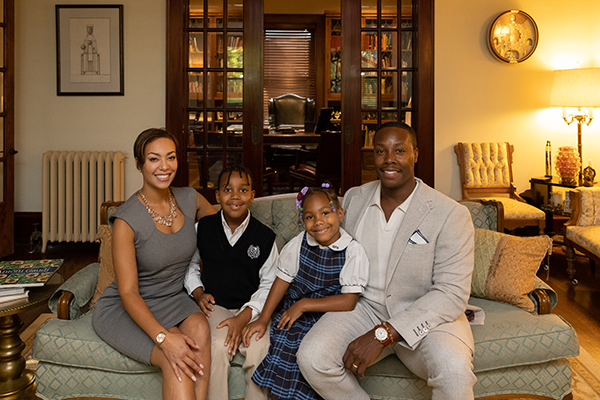
“I was determined to try to keep this going,” he said. “And there were some other people in the community who were also very supportive of him continuing. I know that from a period where we suspended the campaign to where we reinitiated the campaign, I was just calling everybody that I could, ‘Hey, call Mike. Tell him that you’ll be behind him if he ran a write-in campaign.’ He was overwhelmed with calls. Somewhere, somebody convinced him — or maybe all the collective convinced him — that we can do this.”
Duggan won in a landslide and took his seat in the Manoogian Mansion at the start of 2014. Barnhill stayed on, carving out a position as chief talent officer in the mayor’s first administration. He stayed for five years, leaving his post in 2018 to pursue business opportunities and seek out new challenges.
The good fight continues
In the city, there’s still plenty of work that needs to be done — especially in the neighborhoods. Though Barnhill expresses little interest in any high office right now, he admits that running for a seat on the WSU Board of Governors in 2018 was a nod to his love of public service — but also a bit of an homage to the woman who initially fostered his belief that he could make change.
“My mother went to Wayne State when we were growing up,” he says. “That’s where she received her nursing degree. So growing up, I see her studying, I’m studying. I’m seeing her go through what she needs to go through, working and going to school. And I saw her accomplish her goal and saw our lives get better. By the time I graduated high school, my parents, they bought a house in a nice neighborhood on the west side. This was the opportunity that Wayne State provided. So, I feel like I want to be able to preserve that opportunity for other families, for other people who want to do better in their lives. And I value Wayne State as an institution that helps make that happen.”
Barnhill points specifically to WSU’s determination to improve social mobility for students and graduates, saying that that mission aligns perfectly with his own hopes for the university.
“My goal is to continue to make Wayne State a place that is accessible to people and also be a place to help folks better themselves through higher education,” he says. “Our focus as a university is to become the number one school for social mobility, which is just a fancier way of saying kind of what I had in mind earlier. And I thought it would be, not just a way to stay involved in public service, but to stay involved in public service in a low-key way.”
And so, Barnhill says, he goes to work in the community, at WSU and inside Ford, the same way he has from the start: in earnest sincerity and with both feet firmly planted where he thinks he will do the most good.
The earthworms would no doubt be pleased.
This story originally appeared in the fall 2022 issue of Warriors magazine.
